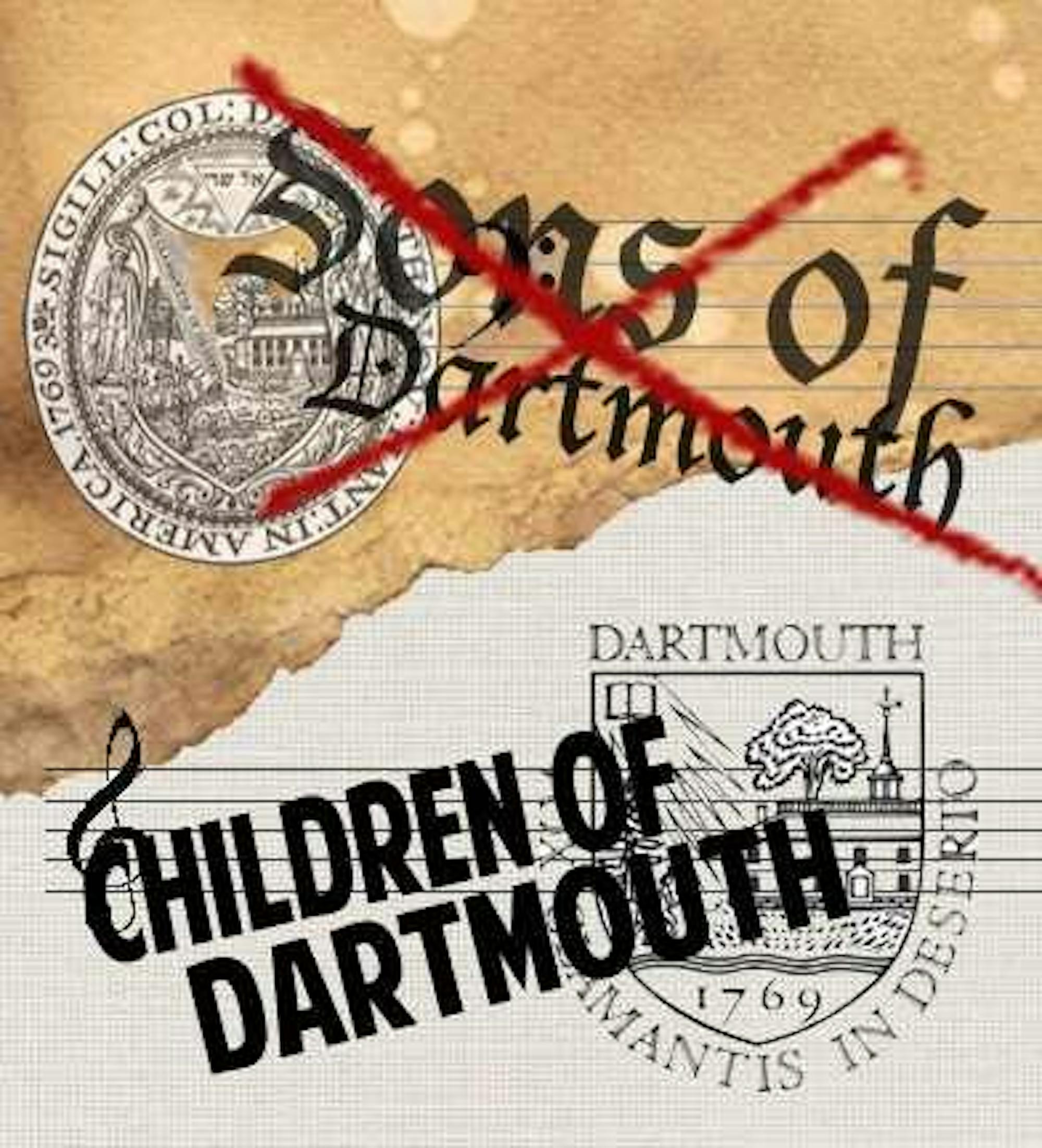Within an instant, the Moosilauke Ravine Lodge goes black. “Dear old Dartmouth, give a rouse / For the College on the hill...”
The inexperienced members of the Class of 2018 mutter along and then briefly pause as the banner with the lyrics falls to the ground.
One student, though, has her own concerns other than the fallen banner. Heads turn as Dondei Dean ’17 recites her own amended version of the alma mater over the silence. She waits for the lines, “For the sons of old Dartmouth / For the daughters of Dartmouth,” and then cries out, “And everybody else!”
Dean’s decision raises a new concern about the lyrics of our school’s song — namely that, as it stands, the song implies a gender binary. While the attention to including more than just two gender identities may be a newer consideration of the lyrics, her protest marks just one of many historical moments to change the alma mater since the song was officially composed by Harry Wellman of the Class of 1907 and adopted by the school in 1926.
According to “The Alma Mater,” a piece by Barbara Kreiger that appeared in “Miraculously Builded in our Hearts: A Dartmouth Reader,” the words to the alma mater were originally written in 1894 by Richard Hovey, a member of the class of 1885. Then known as “The Dartmouth Song,” the College’s first alma mater represented the student body comprised almost entirely of men until the College introduced coeducation in 1972. In 1926, the College officially titled the piece “Men of Dartmouth.” The piece was to be sung as a tradition at commencements and important College events. During the years of World War II, the College and its students reverted to singing a piece titled “Dartmouth Undying.”
After the school allowed women to enroll in 1972, however, the lyrics to “Men of Dartmouth” did not change to represent the female student body until then-College President James Freedman oficially recognized and adopted new lyrics 16 years later.
In 1972, then-College President John Kemeny began the academic year with a speech addressed to the “men and women of Dartmouth” and ended convocation by singing “Dartmouth Undying” instead of Men of Dartmouth,” a decision made with the approval of the College’s Board of Trustees in order to respect the women entering the new class. Kemeny’s move was controversial, but a poll in The Dartmouth of women in the first-female inclusive class found that many women did not object to the lyrics originally written by Hovey. One woman said, “If men want to sing about rocks in their heads, it’s fine with me.”
As subsequent female students enrolled at the College, the alma mater was met with more opposition and calls for reform. In May 1986, the College’s Council on Diversity met to consider revisions to the lyrics of “Men of Dartmouth.”
It was not until two years later, in 1988, that the College officially changed the alma mater to include women, including the lines “for the daughters of Dartmouth” and “stand as sister stands by brother.” The new version of the alma mater was conceived and edited by several students, then-music professor Charles Hamm and then-Dean of the College Edward Shanahan. The revised addition included eight changes to Hovey’s original lyrics.
Even after the College officially adopted the new “Alma Mater,” many students protested the change to the longtime tradition.
Enrolled in one of the first classes to include women at the College, Ellen Oppenheim ’79 reflected back on her experiences when the College was made up of roughly two-thirds male students.
Oppenheim said she found the lyrics exclusive at the time.
“I absolutely remember that my female friends and I came up with our own version to say ‘Students of Dartmouth’ instead of ‘Men of Dartmouth,’ to be a more inclusive version when we would link arms and sing together,” she said.
While Oppenheim and her female friends protested the male-oriented lyrics, she recalls that the majority of students at the time did not take issue with the song.
“Where we saw some kind of issue was when we’d be at football games, and the alums — who still preferred the College to be a male institution — would heckle us and even sometimes boo and hiss if they heard us improvising the lyrics to represent ourselves,” she said.
Oppenheim believes that the issue was not with the students, but more with alumni who were opposed to the idea of coeducation.
Elizabeth Moder ’79, who was a member of the Dartmouth Glee Club during her time at the College, remembers learning the original lyrics to the song early in her Dartmouth career.
“I sang it all the time,” she said. “So I didn’t think much about the words at the time, and it seemed normal to me. I didn’t feel like it was exclusive. I just thought it was generic.”
Moder said that in her generation, men dominated social and verbal interactions, so she was accustomed to the feeling.
“I had a great experience,” she said. “But I would guess that a lot of my women classmates thought that the language [of the alma mater] was inappropriate.”
Moder did note, however, that while enrolled at the College, she avoided older alumni who did not always approve of the College’s decision to allow women to enroll.
Stutz also recalls that many of his classmates were upset with the new lyrics and continued singing the song the original way.
“I don’t recall anybody saying ‘I’m glad the lyrics changed to better reflect the student body,’” he said. “I think some people didn’t understand why it needed to be changed, so there was a very slow acceptance of the new changes.”
Reflecting back on his college years, Stutz notes that when he attends class reunions now, everyone sings “Alma Mater” with the new lyrics.




